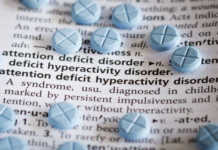In the United States, 7.77 percent of children take stimulant medications. In France the number is only 0.46 percent. A new study in the journal Social Science and Medicine explores why French children take stimulants far less than children in the United States. The study, authored by medical sociologist Manuel Vallée, is called “The countervailing forces behind France’s low Ritalin consumption.”1 Vallée looks at how particular forces in society, in concert with government agencies, became an effective check on stimulant marketing for kids in France. The study considers one particular case—the low use of Ritalin among French children.
Vallée asks: How does France limit its children’s use of psychostimulant drugs? To answer, he looks at “countervailing forces” in French society that mobilized to check the pharmaceutical industry’s influence with respect to Ritalin, which is the only stimulant approved for children in France. The forces he identifies are government agencies, medical professionals, and consumers (parents).
Vallée shows how French child psychiatrists worked against industry efforts to market Ritalin in three ways:
- Research related to classification systems (i.e., not expanding the ADHD diagnosis to include normal, highly active children).
- Day-to-day clinical activities (i.e., looking carefully at a child’s lived experience and social environment).
- Shaping public debate about stimulant drugs (i.e., keeping medical practice independent of industry financial influence).
How do marketers generally expand consumption of their drugs? The study identifies several methods including marketing and promotion; controlling the science that underpins the development of new products; constructing new medical categories and expanding existing ones; and funding consumer groups. (The story of how these tactics have succeeded in expanding the use of stimulant drugs by children in the United States can be found in my book A Disease Called Childhood: Why ADHD Became an American Epidemic.)
So how can the industry be tamed? How can those who oppose aggressive marketing of drugs for children become effective countervailing forces? The history of psychostimulants in France sheds light on this.
Stimulant manufacturers have historically had a weak presence in France. Marketing Ritalin for kids arrived in France in 1975, 14 years later than in the United States. France hasn’t allowed certain other stimulants—for example, Dexedrine—to be prescribed for children at all. This is in contrast to the United States where Dexedrine was approved for childhood behavior problems in 1961. Also, Ciba-Geigy (now Novartis) pulled Ritalin from the French market between 1985 and 1995 because the drug was causing “a public relations nightmare.”
Since France does not allow direct-to-consumer advertising of stimulants, manufacturers couldn’t promote their drugs there as they have in the United States. They also did not lobby doctors as aggressively as they have in the United States because of significant resistance to prescribing stimulants for kids.
Vallée and other medical sociologists have observed that governments can shape what medications are consumed by deciding which ones become legal and how tightly they are regulated. Between 1975 and 1985, France limited the prescribing of Ritalin to hospital-based pediatric specialists (child psychiatrists, pediatricians and pediatric neurologists), whereas in the United States any practicing doctor, and in some states nurse practitioners, can prescribe Ritalin to children. In France, only three hospital pharmacies were authorized to distribute Ritalin; the U.S. imposed no such restrictions. Also, French parents could only receive a one-week supply, whereas parents in the U.S. could obtain 30-day supplies. Post-1995, some French regulations were relaxed, but Ritalin prescription remained low.
Doctors did their job. French pediatricians rejected the guidelines of the American-produced diagnostic manual, the DSM-III, and followed their own classification manual for childhood emotional problems. In the French manual, the definition of ADHD is not as broad as in the American guide. French doctors reserved stimulants for severe cases, and then only in children over age six. In the United States, stimulants may be prescribed to children as young as four. In France, stimulants were part of a broader approach which included family and individual therapy, school interventions, parenting groups, etc. French doctors would not hand parents a prescription after a 20-minute review of a checklist; while in many clinical practices in the United States, stimulants are a first-line treatment, French doctors generally view them only as a last resort.
French parents became more informed. In the process, they became more firmly opposed to drugging their children. The French support group HyperSuper has focused on increasing parental access to psychosocial interventions and actively opposed reductionist conceptions of ADHD. The group’s American counterpart, CHADD, accepts funding from the pharmaceutical industry and has largely adapted the biological narrative of ADHD and treatment with stimulants.
In short, French doctors, parents, and government agencies were not co-opted by the financial influence of the pharmaceutical industry, and cooperated together to keep children off of stimulants.
Vallée concludes that industry influence can be curtailed when it lacks support from regulators, doctors, and consumers. The French model shows that not only government policies, but also public opinion, can become a countervailing force to the power of major marketers. Vallée plans to follow his study with a book on the treatment of ADHD in France.
The French model provides a good example for regulators, doctors, and families in the United States, where the medicalization of children’s normal reactions to stressful situations has gotten out of control.















Thank you for this insight, it’s very important. I particularly think this would be a step in the right direction.
“France limited the prescribing of Ritalin to hospital-based pediatric specialists (child psychiatrists, pediatricians and pediatric neurologists), whereas in the United States any practicing doctor, and in some states nurse practitioners, can prescribe Ritalin to children.”
I didn’t know primary care physicians could prescribe mind altering psychiatric drugs twenty years ago, when I was first prescribed them. And my PCP lied to me claiming these neurotoxic drugs were “safe … meds.”
Definitely, limiting the prescription of all the neurotoxic and mind altering psychiatric drugs to just the psychiatrists should be the law in all countries, if we can’t eliminate the prescription of these drug classes all together.
Eliminating the direct to consumer pharmaceutical advertising is also a must. If for no reason other than our mainstream media is now “fake news” because, at least in part, it is controlled by the pharmaceutical advertisers. For goodness sakes, most Americans still believe “depression is caused by chemical imbalances in people’s brains.” Which was false pharmaceutical/psychiatric industry advertising in the first place, thus it was illegal advertising.
“Trust your doctor,” no. Bad advise, most doctors are brainwashed by big Pharma, thus know nothing about the adverse effects of the drugs they prescribe.
Report comment
It is a good point Someone Else.
I didn’t know bus drivers could prescribe mind altering psychiatric drugs 8 years ago when I was first prescribed benzos without my knowledge. But there you have it. It just makes getting people to talk so much easier when subjecting them to “actue stress reactions” before interrogations.
So here in Australia we have gone the other way. Think your child needs Ritalin? No need to waste your time waiting in a Doctors office for a prescription, have a friend supply it and spike their food with it. Any problems and a doctor can sign a prescription for it later to ensure no criminal action can be taken against you. You were after all acting in “good faith” right?
It’s simply amazing the things you can call ‘medicine’ if you try hard enough and know a doctor who we can call a ‘friendly’. Personally I prefer the term fraudster but in the environment we are in at the moment we have a Minister for Health calling convenience killings “assisted dying” so language is changing at a rate it is difficult to keep up with. And anyone who has been subjected to Mental Health Services knows exactly how “voluntary” services are when it comes to a doctor. Informed consent? This guy is a comedian lol
Couldn’t agree more regarding the elimination of these drugs altogether.
Report comment
Watchout, this will be like with Autism, where US and UK groups pressure them to treat ADHD as a real objective physical condition.
Report comment
It is encouraging to know that professionals have resisted this effort in France. I wish this kind of thinking would catch on around the world!
Report comment
People have resisted this pertaining to Autism, in France. These have been mostly psychoanalysts. Now psychoanalysts are not lawyers. But at least they are not trying to ~treat autism~ via ~behavioral therapies~.
It is the US and UK Autism Advocates, like Alex Plank, who have put pressure on France, making such ~treatments~ into a human rights issue, and also promoting neo-liberalism.
Report comment